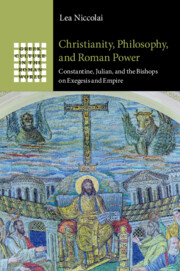 Christianity, Philosophy, and Roman Power
Christianity, Philosophy, and Roman Power Book contents
- Christianity, Philosophy, and Roman Power
- Greek Culture in the Roman World
- Christianity, Philosophy, and Roman Power
- Copyright page
- Dedication
- Epigraph
- Contents
- Figures
- Preface
- Acknowledgements
- Abbreviations, Editions, and Translations
- Introduction
- Part I At Constantius’ Court: Julian Caesar
- Part II Making and Breaking Constantine: Julian Augustus
- Part III After Julian: Philosophy in the World
- Chapter 5 Those Who Know If the Emperor Knows
- Chapter 6 Wisdom for the Many, and Wisdom for the Few
- Conclusions
- Bibliography
- Subject index
- Index Locorum
Chapter 6 - Wisdom for the Many, and Wisdom for the Few
from Part III - After Julian: Philosophy in the World
Published online by Cambridge University Press: 07 July 2023
- Christianity, Philosophy, and Roman Power
- Greek Culture in the Roman World
- Christianity, Philosophy, and Roman Power
- Copyright page
- Dedication
- Epigraph
- Contents
- Figures
- Preface
- Acknowledgements
- Abbreviations, Editions, and Translations
- Introduction
- Part I At Constantius’ Court: Julian Caesar
- Part II Making and Breaking Constantine: Julian Augustus
- Part III After Julian: Philosophy in the World
- Chapter 5 Those Who Know If the Emperor Knows
- Chapter 6 Wisdom for the Many, and Wisdom for the Few
- Conclusions
- Bibliography
- Subject index
- Index Locorum
Summary
Chapter 6 investigates the debate surrounding Julian’s final – and fundamental, in the eyes of late Roman intellectuals – objection to Christianity: his critique of its universalising rhetoric. Third- and fourth-century bishops legitimised their increasing political prominence through competitive arguments pointing to Christianity as the only philosophy that was accessible to everyone, including the ill-educated. Julian set in opposition to this the Platonist belief that any self-confessed system of knowledge appealing to the many disqualifies its intellectual authority by revealing crowd-pleasing (hence, deceptive) ambitions. The reaction of upper-class Christians, divided between the popular consensus and allegiance to Julian’s elitist sensibilities, demonstrates the criticality of this argument. Yet – as I show in the second section – the Neoplatonic objection to the Christian rhetoric of universalism ultimately displaced non-Christian philosophers from the political scene (Eunapius’ Lives of the Philosophers and Sophists). Moreover, the rising popularity of ascetic leaders encouraged even highly authoritative ecclesiastical voices (e.g., John Chrysostom) to question the validity of Greco-Roman education. This, ironically, resulted in a power-driven challenge to the validity of the cultural system whose adaptation had been key to stabilising Christian power.
Keywords
- Type
- Chapter
- Information
- Christianity, Philosophy, and Roman PowerConstantine, Julian, and the Bishops on Exegesis and Empire, pp. 267 - 301Publisher: Cambridge University PressPrint publication year: 2023
